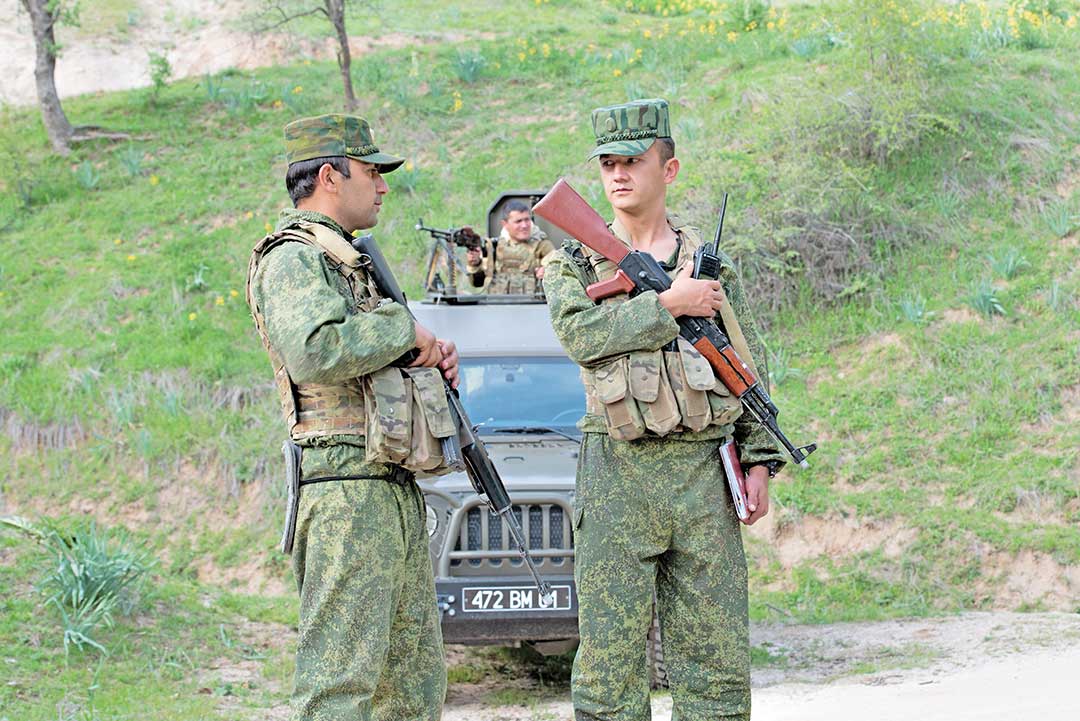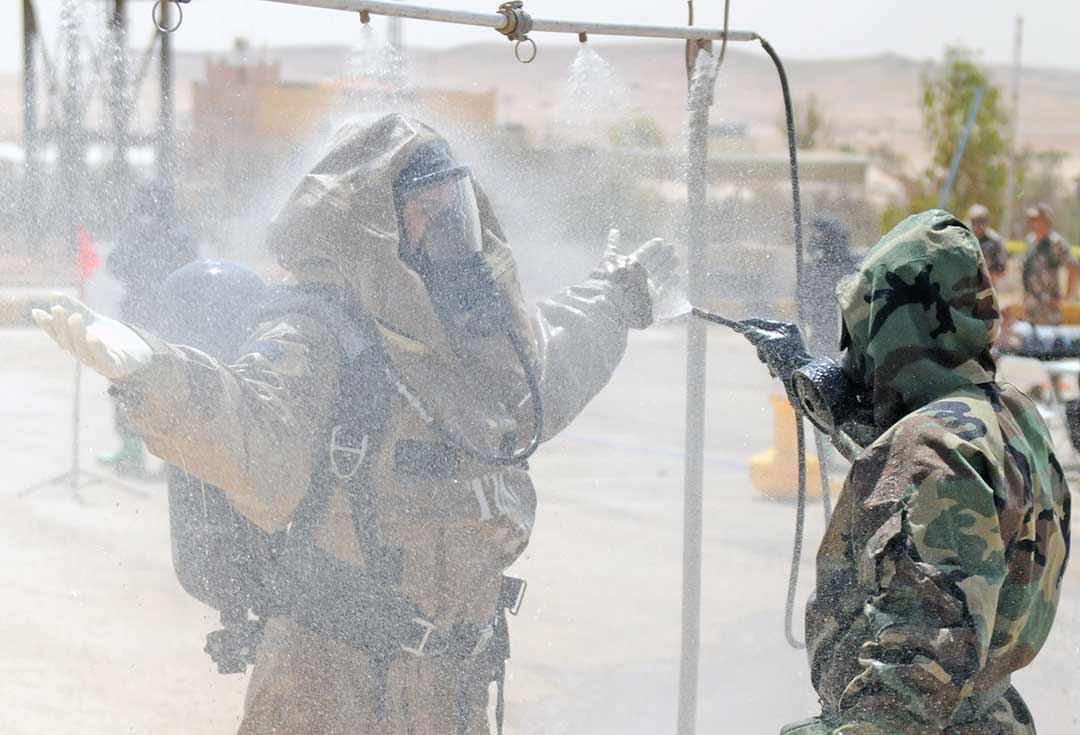Tracking Transportation to Deter Disaster
Central Asian officials examine ways to stop the proliferation of weapons of mass destruction
UNIPATH STAFF
After the dissolution of the Soviet Union, residents of Central Asia found themselves living among stockpiles of radiological material. Uranium mines, storage warehouses and processing plants — and in some cases actual nuclear weapons — were the inheritance of their recent Soviet past.
Thirty years of denuclearization and cleanup of radiological waste have made Kazakhstan, Kyrgyzstan, Tajikistan, Turkmenistan and Uzbekistan much safer. But the problem of illicit transfers of nuclear material — and the advent of new challenges with terrorists seeking chemical and biological weapons — demands a renewed focus on countering weapons of mass destruction (WMD).
Dr. Ilhom Mirsaidzoda, head of Tajikistan’s Chemical, Biological, Radiological and Nuclear (CBRN) Safety and Security Agency, recounts an episode from May 2021, when Tajik agents posing as Afghan buyers seized a shipment of 607 grams of uranium-235 (U-235) pellets from smugglers. U-235 is the enriched variety of the heavy element used for nuclear fission. The origin of the smuggled uranium wasn’t immediately apparent.
“We are working with our colleagues from the United States with the shipment of uranium pellets to Los Alamos to see the country of origin,” Mirsaidzoda said.

The ongoing challenge of preventing the production and proliferation of WMD consumed most of a week in Budapest, Hungary, in September 2022. The U.S. Defense Threat Reduction Agency and U.S. Central Command invited dozens of representatives from the Central Asian security sector to the 4th Central and South Asia Regional Counter Weapons of Mass Destruction Symposium.
The symposium consisted of lectures from experts in the field and a desktop simulation that called upon multinational participants to combine forces to counter a WMD crisis. Attendance included 25 officials from Kazakhstan, Tajikistan, Turkmenistan and Uzbekistan, mostly Soldiers and customs officers whose jobs entail guarding national borders.
Countries were urged to control WMD by strengthening border security, conducting intelligence-based risk assessments and improving regulations at the national level. A large part of the latter is curtailing the export of potentially “dual-use” materials and technology that terrorists and criminals can use to make weapons.
Most seminar attendees were familiar with the lethal potential of viruses and other biological agents falling into the wrong hands. As Dr. Sermet Sezigen of Turkey’s University of Health Sciences in Ankara said at the symposium: “After COVID-19, biological threats became much more important.”
But even innocent-seeming materials and technology employed for routine industrial applications are vulnerable to misuse by rogue states and terrorists. In some cases, businesses shipping these items abroad are not even aware they are involved in potential wrongdoing.
Isostatic presses, used for metal fabrication, are also an important tool to make missile tips or nuclear centrifuge equipment. Likewise, aluminum powder, useful in coatings and paints, can be turned into flammable rocket propellant.
To highlight the difficulty of stopping harmful exports, debris from a North Korean missile that crashed into the Pacific Ocean was found to contain components made in the United States and the European Union. Both governments had striven to keep such technology from Pyongyang’s grasp.

Success stories
Almost all the countries of Central Asia have ratified national action plans under United Nations Security Council Resolution 1540, approved in 2004 with the aim of stopping proliferation of WMD. Some, like Tajikistan, have gone even further in installing an anti-WMD regimen.
Mirsaidzoda affirmed that all the country’s main border posts are equipped with radiation monitors. In August 2022, Tajikistan opened a northern branch office of the CBRN Safety and Security Agency. It will train law enforcement in combating WMD. The agency also announced plans to open a duplicate branch office near the nation’s southern border with Afghanistan.
Even more ambitiously, the Tajiks operate a CBRN Forensics and Training Center in Dushanbe that they hope will become a leader in the field of countering WMD. As part of the training center, Tajikistan aims to assemble a nuclear forensics library to track and record the geographic origins of fissionable material.
“We hope it can serve the needs of the whole region,” Mirsaidzoda said of the forensics and training center.
Vigorous border control can also go a long way to stymie criminals and terrorists intent on harm.
Brig. Gen. Amine Al Kai of Lebanon noted how his country’s largely rural and mountainous border with Syria is equipped with sensors to counter radiological and chemical weapons and deploys trained troops to operate them.
When it comes to blocking nuclear material, detectors like radar and Geiger counters should be employed at strategic points like ports and railyards, another symposium attendee said. A “layered and unpredictable” defense is best at thwarting bad actors.
Jesse Munoz, a deputy chief patrol agent of the U.S. Border Patrol, vouched for the effectiveness of walls and fences to limit access. Terrorists sometimes hire drug cartels to take advantage of cartels’ networks and know-how, he said, and stationary barriers are 90% effective at controlling cross-border movement.
Tracking shipments
Intercepting shipments of WMD is often a matter of tracking and tracing complex movements of global cargo to reveal a potentially malicious end user.
The case of Monear Eldrissy is illustrative. A British military team stationed in Basra, Iraq, discovered bomb-making components — particularly circuit boards — in a terrorist hideout and shipped the material back to Great Britain.
British officials worked with private industry and learned that Eldrissy, a British citizen of Libyan descent with a criminal record, had bought the circuit boards.
Rather than immediately arrest Eldrissy, the British allowed him to ship more circuit boards, this time to the United Arab Emirates using a popular global shipping company. From the UAE, the package was forwarded to Iraq.
Unmasking Eldrissy’s role in the terrorist bomb-making plot ultimately involved cooperation among the British, UAE, Iraqi, German and Azerbaijani authorities. At one point, police attached electronic trackers to the package in what is known as a “controlled delivery.”
To help curtail the likes of Eldrissy, the World Customs Organization publishes a guidebook to help countries enforce strategic trade controls on exports of dual-use products. Such controls begin with national legislation to regulate technology transfers, including fines and penalties for individuals, companies and research laboratories that break the rules.
Progress has been slow. When it comes to restricting shipments of biological and chemical agents — substances that can do the most harm in small quantities — close to 95% of countries have no laws to restrict their export.


Comments are closed.